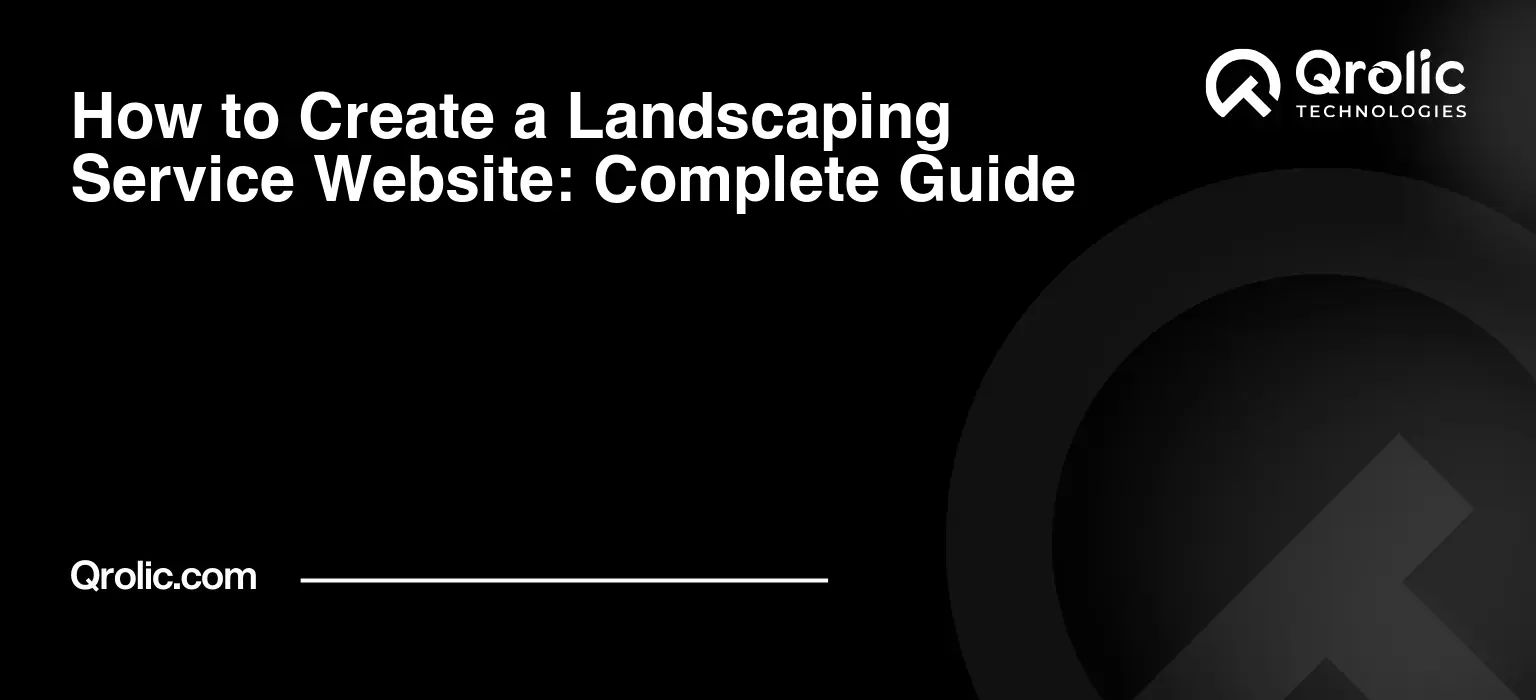In today’s digital world, a strong online presence is no longer a luxury but a necessity for any business, and landscaping companies are no exception. The lush beauty and meticulous detail you bring to the physical world must be mirrored by a professional and engaging online experience. This article delves deep into the world of web development for landscaping companies, offering a comprehensive guide on how to create a website that not only looks great but also drives growth and attracts new customers. We’ll explore the “why”, “what”, and “how” of effective web development for your landscaping business.
Quick Summary:
- A strong website attracts clients and showcases your landscaping work.
- Key features include responsive design, visuals, and easy navigation.
- Optimize for local search (SEO) and fast loading speeds.
- Continuously monitor and improve your website for best results.
Table of Contents
- Why is Web Development Crucial for Landscaping Companies?
- 1. First Impressions Matter: Your Website is Your Digital Curb Appeal
- 2. Lead Generation and Business Growth: Turning Clicks into Customers
- 3. Showcasing Your Portfolio: Visual Proof of Expertise
- 4. Building Brand Identity and Recognition: Differentiating Yourself From the Competition
- 5. Improved Customer Communication: Providing a Seamless User Experience
- What Makes for Best Web Development for Landscaping Companies?
- 1. Responsive Design: A Website That Adapts to All Devices
- 2. Visually Appealing Design: Capturing the Essence of Your Work
- 3. Easy Navigation: Guiding Users Through Your Website
- 4. Compelling Content: Engaging Your Target Audience
- 5. Strong Calls to Action: Encouraging User Interaction
- 6. Local SEO Optimization: Connecting With Your Target Audience
- 7. Contact Forms and Easy Communication: Making it Easy for Potential Clients to Reach Out
- 8. Fast Loading Speed: Ensuring a Smooth User Experience
- 9. Security: Protecting Your Website and Visitors
- 10. Analytics and Tracking: Monitoring Your Progress and Making Adjustments
- How to Implement Effective Web Development for Your Landscaping Company
- Step 1: Planning and Goal Setting: Defining Your Vision
- Step 2: Choosing the Right Platform: Selecting Your Foundation
- Step 3: Design and Development: Bringing Your Website to Life
- Step 4: Content Creation: Crafting Compelling Messaging
- Step 5: Testing and Launching: Ensuring a Smooth Rollout
- Step 6: Monitoring and Optimization: Continuously Improving Your Website
- The Benefits of Professional Web Development
- Case Studies: Examples of Successful Landscaping Company Websites
- Qrolic Technologies: Your Partner in Digital Growth
- Conclusion: Growing Your Business With a Powerful Website
Why is Web Development Crucial for Landscaping Companies?
Let’s face it, potential clients often begin their search for a landscaping service online. If your website isn’t up to par, you’re losing opportunities right from the get-go. Here’s why web development is absolutely essential for your landscaping company:
1. First Impressions Matter: Your Website is Your Digital Curb Appeal
Just as you meticulously design outdoor spaces, your website needs to create a positive first impression. It’s often the first interaction a potential client will have with your brand. A professional, visually appealing, and user-friendly website instantly communicates competence, reliability, and the quality of your work. Think of it as your digital storefront, inviting potential customers in to explore what you offer. A poorly designed website can be a huge turn-off, conveying a lack of professionalism and potentially leading potential clients to choose your competitors.
2. Lead Generation and Business Growth: Turning Clicks into Customers
Your website is a powerful lead generation tool. It should be designed to capture visitor information and convert them into paying customers. With strategically placed contact forms, online booking systems, and clear calls to action, you can effortlessly generate leads and grow your business. A well-optimized website acts as a 24/7 marketing machine, working hard even when you’re not. It allows you to expand your reach beyond your local area, attracting customers who may not have otherwise discovered your services.
3. Showcasing Your Portfolio: Visual Proof of Expertise
Landscaping is a highly visual industry. Your website is the perfect platform to showcase your stunning portfolio. High-quality images and videos of completed projects can demonstrate your expertise and design capabilities. Before-and-after photos can be particularly impactful, allowing potential clients to envision the transformation you can achieve in their own spaces. A compelling portfolio builds trust and credibility, proving your abilities are not just words but tangible results.
4. Building Brand Identity and Recognition: Differentiating Yourself From the Competition
A well-designed website helps build and solidify your brand identity. Your logo, color palette, fonts, and overall aesthetic should be consistent and reflective of your brand’s personality. A strong brand identity helps you stand out in a crowded market and builds recognition among your target audience. It helps to communicate what your company values and what sets you apart from the other landscaping companies.
5. Improved Customer Communication: Providing a Seamless User Experience
A well-developed website offers improved customer communication. It allows you to address frequently asked questions, provide valuable information about your services, and make it easy for potential customers to contact you. A user-friendly website provides a positive experience, fostering engagement and building stronger relationships with your customers. Clear contact details, FAQs, and testimonials can make all the difference in securing a new client.
What Makes for Best Web Development for Landscaping Companies?
Now that we’ve established the “why,” let’s delve into the “what.” Here’s what constitutes effective web development for landscaping businesses:
1. Responsive Design: A Website That Adapts to All Devices
In a mobile-first world, a responsive website is non-negotiable. This means your website should adapt seamlessly to different screen sizes – desktops, tablets, and smartphones. A user on the go should have the same positive experience as a user browsing on a desktop. This ensures optimal viewing and usability, no matter what device your potential client is using. Neglecting responsive design is a huge mistake that can alienate a significant portion of your potential audience. Google also prefers mobile-friendly websites, so it is also critical for SEO.
2. Visually Appealing Design: Capturing the Essence of Your Work
Since landscaping is a visual service, your website should reflect that. Your website should be visually appealing, with high-quality images and videos that capture the beauty of your work. A well-designed layout, a cohesive color scheme, and appropriate use of white space are crucial. Using professional, high-resolution images and videos is crucial to showcase your best work. Avoid cluttered designs, and aim for a modern, clean, and easily navigable layout.
3. Easy Navigation: Guiding Users Through Your Website
A clear and intuitive navigation structure is essential for user experience. Potential clients should be able to find the information they need quickly and easily. Use clear, concise labels for your menu items, and make sure your website is easy to browse. A complicated or confusing navigation will frustrate users and they will likely leave your website. Think about the most important information a potential client would be seeking (e.g., services, portfolios, contact information) and ensure these are readily available.
4. Compelling Content: Engaging Your Target Audience
Your website content is just as crucial as its design. It should be well-written, informative, and engaging. Use clear, concise language and highlight the benefits of your services. Tell a story about your company and showcase your expertise. Your content should resonate with your target audience and communicate the value you bring to them.
- Service Descriptions: Provide detailed descriptions of the landscaping services you offer, from lawn care to landscape design to irrigation systems.
- About Us Page: Share your company’s story, values, and what sets you apart from your competition. This is your chance to create a personal connection with potential clients.
- Blog: Regular blog posts about landscaping tips, seasonal advice, and your latest projects can be a valuable content marketing tool, attracting new visitors and positioning you as an industry expert.
- Testimonials: Feature reviews and testimonials from satisfied clients to build trust and credibility. Social proof can be a very powerful motivator for potential customers.
- FAQ Page: Address common questions related to your services, pricing, and process, saving time and effort for both you and your potential clients.
5. Strong Calls to Action: Encouraging User Interaction
Your website should guide visitors to take action. Use clear and compelling calls to action throughout your website, such as “Get a Free Quote,” “Schedule a Consultation,” or “Contact Us Today.” Make these buttons or links prominent and easy to find. A well-placed call to action can mean the difference between a casual visitor and a new customer.
6. Local SEO Optimization: Connecting With Your Target Audience
For local landscaping companies, local SEO is absolutely essential. Optimize your website with keywords relevant to your geographic area, and claim your Google My Business listing. Local SEO strategies will help you appear in search results when local customers are looking for landscaping services.
- Google My Business Optimization: Claim and optimize your Google My Business profile with accurate business information, high-quality photos, and customer reviews.
- Local Keywords: Incorporate location-specific keywords in your website content, such as “[city] landscaping services” or “[neighborhood] lawn care.”
- Local Citations: List your business in local online directories like Yelp, Yellow Pages, and industry-specific websites.
- Schema Markup: Use schema markup to help search engines understand the context of your business, including your location and services.
- Local Link Building: Earn links from other local businesses and websites.
7. Contact Forms and Easy Communication: Making it Easy for Potential Clients to Reach Out
Make it easy for potential clients to contact you. Provide clear contact information, including your phone number, email address, and physical address (if applicable). Include a contact form on your website so visitors can easily submit inquiries. A live chat feature can also be a great addition to provide instant support and answer questions in real time. The easier you make it for people to contact you, the more likely they are to do so.
8. Fast Loading Speed: Ensuring a Smooth User Experience
A slow-loading website will frustrate users and increase your bounce rate. Optimize your images, use a caching plugin, and choose a reliable web hosting provider to ensure your website loads quickly. Page speed is not only important for user experience but also for SEO rankings. Search engines prioritize websites that load fast.
9. Security: Protecting Your Website and Visitors
Website security is paramount. Use HTTPS protocol to ensure that all communications between your website and visitors are encrypted. Protect your website from malware and other security threats by using strong passwords and regularly updating your plugins and themes. A secure website is essential for building trust with your visitors.
10. Analytics and Tracking: Monitoring Your Progress and Making Adjustments
Track your website traffic and user behavior using tools like Google Analytics. This data will give you valuable insights into how visitors are interacting with your website and help you to identify areas for improvement. Use this information to make informed decisions and optimize your website for better results. Regularly review your analytics data to understand what’s working and what’s not.
How to Implement Effective Web Development for Your Landscaping Company
Now, let’s move to the “how.” Here are the steps involved in implementing effective web development for your landscaping business:
Step 1: Planning and Goal Setting: Defining Your Vision
Start by defining your goals. What do you want your website to achieve? Do you want to generate more leads, increase brand awareness, or showcase your portfolio? Identify your target audience and what they are looking for in a landscaping company.
Step 2: Choosing the Right Platform: Selecting Your Foundation
Select a content management system (CMS) or platform that suits your needs. WordPress is a popular and versatile option that offers a range of customization options and plugins. Choose a platform that is user-friendly, scalable, and secure.
Step 3: Design and Development: Bringing Your Website to Life
Work with a professional web developer or designer to create a visually appealing and functional website. Ensure that your website is responsive, easy to navigate, and optimized for search engines. Focus on a design that aligns with your brand identity and reflects the quality of your work.
Step 4: Content Creation: Crafting Compelling Messaging
Develop engaging and informative content that resonates with your target audience. Showcase your portfolio, describe your services, and provide valuable information about landscaping. Regularly update your content and keep it fresh and relevant.
Step 5: Testing and Launching: Ensuring a Smooth Rollout
Before launching your website, thoroughly test it on different browsers and devices. Fix any bugs or errors and ensure that all functionalities are working correctly. Once you’re satisfied with the result, you can launch your website.
Step 6: Monitoring and Optimization: Continuously Improving Your Website
After launching your website, use analytics tools to track its performance. Monitor your website traffic, user behavior, and keyword rankings. Use this data to make informed decisions and optimize your website for better results.
The Benefits of Professional Web Development
While it’s tempting to handle web development yourself or go with the cheapest option, investing in professional web development services is a smart move. Here’s why:
- Expertise: Professional web developers have the skills and expertise to create a website that is not only visually appealing but also functional, user-friendly, and optimized for search engines.
- Time Savings: Building a website from scratch can be time-consuming. Professional developers can take care of the process, allowing you to focus on running your business.
- Results-Driven: Professional developers understand the importance of data-driven decision-making and focus on creating a website that delivers results.
- Long-Term Value: A professionally developed website is an investment that pays off in the long run by generating leads, increasing brand awareness, and driving business growth.
Case Studies: Examples of Successful Landscaping Company Websites
Let’s look at some examples of what other landscaping companies are doing well with their websites:
- [Company Name 1]: This website showcases a stunning portfolio of diverse landscape projects with high-quality photography. The navigation is clear, making it easy for visitors to explore different types of work. They have a strong focus on local SEO, with content targeted to the specific cities they serve.
- [Company Name 2]: This company uses a blog to share insightful articles about landscaping tips and tricks, attracting potential customers to their site and positioning them as an authority in the industry. They have also implemented an online booking system, making it easy for potential clients to schedule services.
- [Company Name 3]: This company’s website has a streamlined design with a clear focus on user experience. The contact forms are easily accessible, and the calls to action are very effective in generating leads. They also use video testimonials to build trust with potential clients.
These examples demonstrate the diverse ways that landscaping companies are using web development to achieve their goals. It’s about finding what works best for your specific business and continually optimizing your approach.
Qrolic Technologies: Your Partner in Digital Growth
At Qrolic Technologies (https://qrolic.com/), we understand the unique needs of landscaping companies. We offer expert web development services to help you create a website that not only looks great but also drives business growth.
Our services include:
- Custom Website Design: We create websites that reflect your brand identity and resonate with your target audience.
- Responsive Design: Your website will adapt seamlessly to different devices, ensuring a positive user experience for all.
- SEO Optimization: We ensure that your website is optimized for search engines so potential customers can easily find you online.
- Content Creation: We can help you develop engaging and informative content that resonates with your target audience.
- Website Maintenance: We provide ongoing website maintenance and support to keep your website running smoothly.
We believe that a strong online presence is essential for success in today’s competitive market. We are passionate about helping landscaping companies achieve their goals through effective web development. Contact us today to discuss how we can help your landscaping business thrive.
Conclusion: Growing Your Business With a Powerful Website
Web development is no longer an optional extra for landscaping companies; it’s a fundamental requirement for success in the digital age. A well-designed, user-friendly, and SEO-optimized website is a powerful marketing tool that can help you attract new clients, build your brand, and grow your business. By understanding the “why,” “what,” and “how” of effective web development for landscaping companies, you can create a strong online presence that reflects the quality of your services and helps you achieve your business goals. Investing in a professional website is an investment in the future success of your landscaping business. From crafting compelling content to ensuring optimal mobile functionality, each detail plays a crucial role. Don’t just exist online, thrive with a powerful, professional website designed to cultivate your landscaping company’s success. Remember that the most effective web development strategies are not one-time actions, but ongoing processes of evaluation, adaptation, and improvement. Continue to monitor your website’s performance and adjust your strategy to ensure you’re achieving optimal results.









